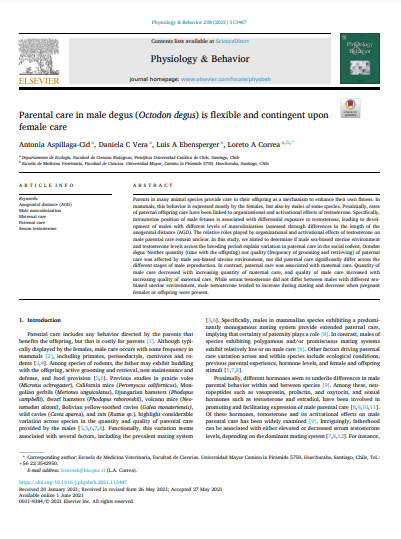Parental care in male degus (Octodon degus) is flexible and contingent upon female care

Fecha
2021-09-01Autor
Aspillaga-Cid, Antonia
Vera, Daniela C.
Ebensperger, Luis A.
Correa, Loreto A. [Univ Mayor, Fac Ciencias, Escuela Med Vet, Chile]
Ubicación geográfica
Notas
HERRAMIENTAS
Acceda a títulos restringidos
¿Cómo descargar?Resumen
Parents in many animal species provide care to their offspring as a mechanism to enhance their own fitness. In mammals, this behavior is expressed mostly by the females, but also by males of some species. Proximally, rates of paternal offspring care have been linked to organizational and activational effects of testosterone. Specifically, intrauterine position of male fetuses is associated with differential exposure to testosterone, leading to development of males with different levels of masculinization (assessed through differences in the length of the anogenital distance (AGD). The relative roles played by organizational and activational effects of testosterone on male parental care remain unclear. In this study, we aimed to determine if male sex-biased uterine environment and testosterone levels across the breeding period explain variation in paternal care in the social rodent, Octodon degus. Neither quantity (time with the offspring) nor quality (frequency of grooming and retrieving) of paternal care was affected by male sex-biased uterine environment, nor did paternal care significantly differ across the different stages of male reproduction. In contrast, paternal care was associated with maternal care. Quantity of male care decreased with increasing quantity of maternal care, and quality of male care increased with increasing quality of maternal care. While serum testosterone did not differ between males with different sexbiased uterine environment, male testosterone tended to increase during mating and decrease when pregnant females or offspring were present.
URI
https://repositorio.umayor.cl/xmlui/handle/sibum/9068https://doi.org/10.1016/j.physbeh.2021.113487
https://www-sciencedirect-com.bibliotecadigital.umayor.cl:2443/science/article/pii/S003193842100175X/pdfft?md5=ef9a8edc0c7e5fd2fc1e4dea084941ff&pid=1-s2.0-S003193842100175X-main.pdf
https://pubmed.ncbi.nlm.nih.gov/34087278/
Coleccion/es a la/s que pertenece:
Si usted es autor(a) de este documento y NO desea que su publicación tenga acceso público en este repositorio, por favor complete el formulario aquí.